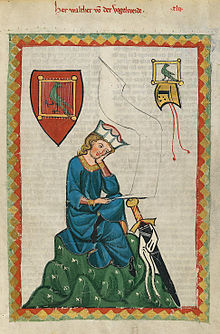
Ir sult sprechen willekomen is a poem by Walther von der Vogelweide from they year 1203. Thematically, it does neither fully belong to the Minnesang nor to the Sangspruchdichtung, but it commingles both forms.
In the 19th century, the poem was rediscovered by German nationalists and even served as an inspiration for Heinrich Hoffmann von Fallersleben and his "Deutschlandlied".
Since 1973, Alois Kircher's theory that Walther in this poem was repudiating an attack by Peire Vidal, who had denigrated the Germans in his 37th Chanson and had praised Provence as the land "from the Rhône to Vence, and from the sea up to the Durance," has gained general acceptance.
Text
|
I. |
|
|
II. |
|
|
III. |
|
|
IV. |
|
|
V. |
|
|
VI. |
|
Reinterpretation
The song "Willkommen" by German band Ougenweide (1976) is based on this poem. The original tune, however, has not been preserved.
Notes
- Moltschanova, Inna (18 May 2005). Preislied 'Ir sult sprechen willekomen'. GRIN Verlag. ISBN 978-3-638-37894-9.
- Alamans trob deschauzitz e vilans ; E quand negus si feing esser cortes, Ira motals cozens et enois es ; E lor parlars sembla lairar de cans… "I find the Germans undistinguished and crude; when one of them makes pretensions to be courteous, It is a mortal punishment and a painful sorrow, and their speech is like the barking of dogs."
- The basic meaning of the word zuht (< zîhen, "to draw forth" (cf. L. educere)) is associated with human breeding and nurturing of livestock. Additional meanings that the word acquired later include 'training' and 'education', particularly of children (including in decency and modesty); "good breeding" is one possible translation, as are "mannerliness," "decency," and even "chastity".
References
- Alois Kircher: Dichter und Konvention. Zum gesellschaftlichen Realitätsproblem der deutschen Lyrik um 1200 (Literatur in der Gesellschaft 18). Düsseldorf 1973.
- Wolfgang Mohr: Die ‚vrouwe‘ Walthers von der Vogelweide. In: Zeitschrift für Deutsche Philologie 86 (1967).
- Hermann Reichert: Walther von der Vogelweide für Anfänger. 3rd, revised volume. facultas.wuv, Vienna 2009, ISBN 978-3-7089-0548-8
| Walther von der Vogelweide | |
|---|---|
| Songs | |
| Manuscripts | |
| Genres | |
| Influences | |